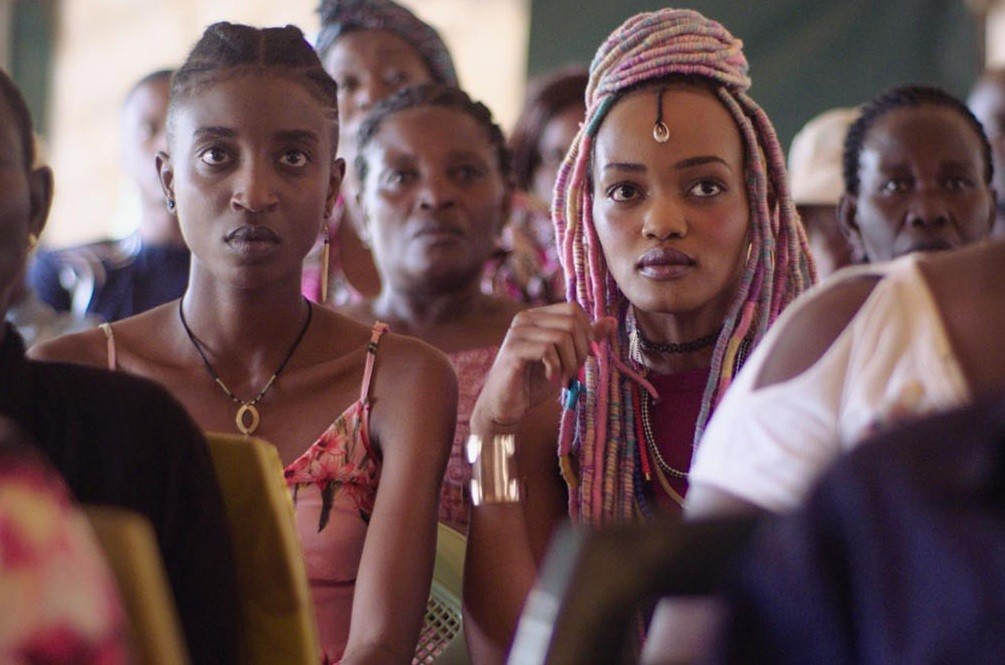[Written by Anna Shams Lli]
[Image Credit: MPM Film]
Rafiki, the Swahili word for friend, is a fitting title for a tale on assumptions and rules of who is allowed to be more than just friends. It was the first Kenyan film to screen at Cannes, where it premiered in 2018 in the Un Certain Regard section, a section reserved for films with a “different point of view” or unique perspective. Same-sex marriage is banned in Kenya, along with sodomy being punishable by 14 years of prison, which certainly gives the film a different perspective. The story follows the young woman Makena, Kena to her friends, as she falls in love with her father’s political rival’s daughter, Ziki.
The film is set in the capital Nairobi, but creates a closed environment in Kena’s neighbourhood where everyone knows everyone and the local election is the end-all. The film first opens with colourful title cards intercut with a montage of the bustling life of the area. Shots of food, guys playing football, and our main character skateboarding down the street give it a distinct nineties teen film feel from the beginning. There is a certain ease to the entire film, which is strange considering the heavy theme of homophobic violence.
This might be Rafiki’s greatest weakness, as it has a hard time finding the right tone. There is a burst of colour and energy throughout, which has been said by the director to show Nairobi as a city full of colour. Five minutes into the film and one of Kena and her best friend, Blackstas, yell slurs after a gay man. While the purpose of this is clearly to show an environment where homophobia can thrive, and Kena’s obvious discomfort, it doesn’t feel like a seamless part of the film. There are multiple instances where it seems that the director, Wanuri Kahiu, had issues with balancing the cute romance story with the heavier material.
As a love story following the difficult coming-of-age of Kena, who is both restricted by her sexuality and ideas of femininity, the film is a simple story told with a distinctively intimate lens. The camera always stays close, whether it’s Kena skateboarding, a longing glance, or hands reaching out towards each other. Instead of a wild sex scene that often seems gratuitous, a candle-lit scene in a van is punctured by shots of the two laying together closely. Together with the soft pastel pink lighting whenever the lovebirds are together, Rafiki stands out from a host of other male-directed tellings of love between two women.
Otherwise, the film may be too simplistic. As an LGBT movie from an anti-LGBT country, it already holds important cultural status. The few days it was allowed to screen in Kenya were sold out, and finding funding took years due to its controversial topic. But compared to other young-adult LGBT movies or even just regular coming-of-age romances, it’s plot is almost too predictable and simple, while consequences only come at the end and in a brief flash. The local political intrigue that is hinted at is never realised and never serves any deeper consequence; the only characters allowed any significant development are Kena and her father to a degree.
It feels as though the film contains too many elements, with the best ones being the brief glimpses into the city life of the youth, and the simple moments they share. An especially outstanding moment is when Kena comes to talk to Ziki on her staircase. The staircase is awash in a pink glow, of course, and they are just talking about exam results. Compared to the romantic gestures, the long stares, and the many dating montages, it is one of the few scenes that feels authentic in its simplicity, and gentle and real in the familiar way they talk together.
Rafiki doesn’t offer a whole lot of originality compared to other films in the genre, yet it is a milestone when viewed in context. The movie takes its title from the fact that LGBT couples in Kenya are forced to introduce their love interests as ‘friends’, which is something I know many other LGBT couples outside Kenya will relate to as well. While it may seem overly sweet or simplistic at times, like a pastel coloured dream, it is also lovely to see something that may inspire some sort of hope in LGBT youth who feel like they don’t belong. The story itself may have been told before, and better, but the setting it is in, and the audience it aims to reach give it a nuance that has yet to be seen.

